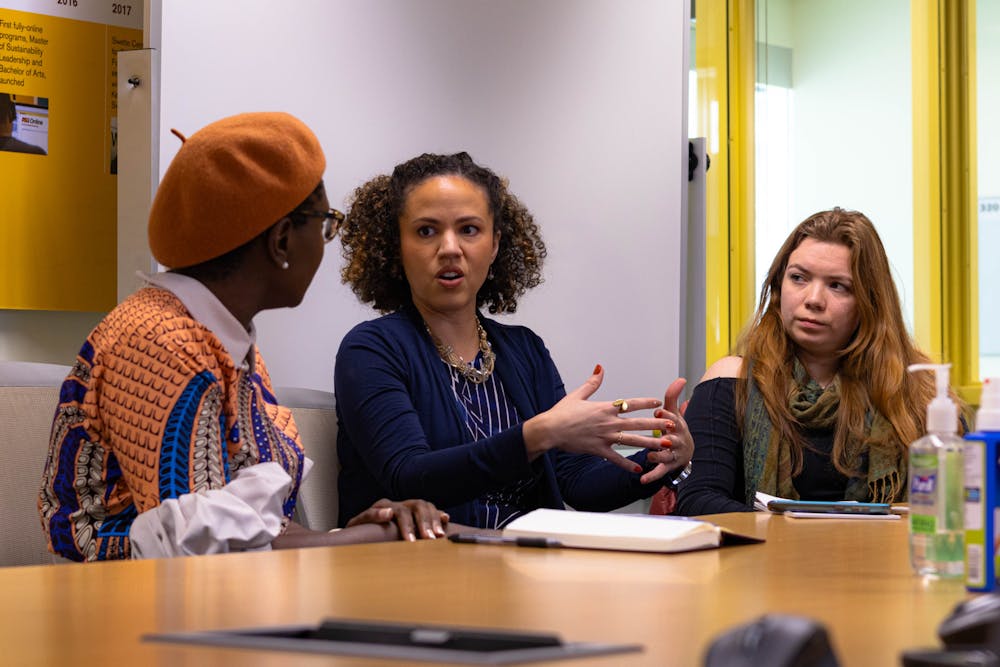While organized life in space always seemed like a plot of science fiction, because of private companies like Blue Origin and SpaceX, it is becoming closer to reality. However, while many are centered on the "settling in space" aspect, one major component that is often overlooked is the aspect of governance.
What separates space governance from other related topics is the unique goal of preventing modern conflicts from spreading to extraterrestrial operations. On Jan. 12 at ASU, a coalition of experts, including Laura Delgado López, Lindsey Wiser and Gershon Hasin, met to discuss the topic with moderator Timiebi Aganaba.
Delgado López is an international affairs fellow of the Council on Foreign Relations at the Center for Strategic and International Studies. She discussed how one of the main hindrances in the way of space governance is the lack of regulation surrounding the topic.
"Law and regulation isn't necessarily catching up," Lopez said in an email. "I particularly look at emerging space countries in Latin America. They're only working on one area and not necessarily focusing on the other pieces ... Sometimes you see people having debates where some say, 'All we need is a policy.' But the policy is not necessarily gonna give you teeth."
Another issue space governance is concerned with is the ethics of resource gathering and whether or not humans should be allowed to extract elements from other celestial bodies.
Wiser is a current Ph.D. candidate at ASU's School of Earth and Space Exploration. According to her, the debate is still active, but there are special considerations to be made about the lasting effects.
"We've also talked about, for example, protection of space environments versus the expansion into space environments. So, protection of the lunar surface, or the Martian surface, or asteroids or even orbit protection of those space environments," Wiser said in an email. "We want to do science free from contamination. We want to keep them available to all. There are lots of actors that are interested in expanding into these places and utilizing resources."
While not related to ethical considerations, satellite contamination, defined as the contamination of space from non-working or unemployed satellites or other space debris, is another unique challenge.
"Timiebi and I had talked about quite a bit ... about mega-constellations and satellite contamination versus a pristine sky, and the different stakeholders engaged with that," Wiser said at the seminar. "There are lots of really fantastic pros, with the idea of large satellite constellations getting access and communication to more people around the world. There are downsides for astronomy, or for communities and cultures that value having a pristine sky without seeing satellite streaks going across it."
Despite the potential issues, those who are studying this subject are still hopeful for the future of regulations and more specifically how they could bring together a large number of people from different sectors.
Hasin is a legal consultant for Fietta and a former visiting lecturer at Yale Law School. While he also brings up how regulations need to be put in place regarding space governance, he believes that as space travel becomes more commercialized, the regulations will naturally follow as they bring people together from several professional fields.
"There's not a lot of law or regulation," Hasin said at the seminar. "It is a very underdeveloped field which needs to be developed. What's particularly interesting in this field is that up until 2015, 2016 or 2017, a lot of it was discussions and fiction. But once we have this significant rise in commercialization, and we see companies and private actors and financial interests going in, this field kind of pulls in people from different, and in some ways more established, disciplines."
Edited by River Graziano, Alysa Horton and Grace Copperthite.
Reach the reporter at hrhea@asu.edu.
Like The State Press on Facebook and follow @statepress on X.

Hunter is a senior studying technological leadership. This is his fourth semester with The State Press. He has also worked as a legislative intern.




